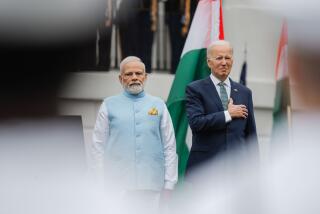India lower house passes nuclear liability legislation
- Share via
Reporting from New Delhi — After a long, bruising political battle, the lower house of India’s parliament on Wednesday passed a civilian nuclear liability bill that would pave the way for American and other foreign companies to join a nuclear-reactor building spree.
As if to punctuate the need for more electricity generation in a nation where power outages are a daily event, the lights went out in the Parliament building just as the bill was brought to a vote. “This is why we need nuclear energy,” said one lawmaker to general laughter.
Passage of the measure came in advance of President Obama’s November trip to the country.
Nuclear equipment suppliers from the United States, Japan, France, Russia and India, including Westinghouse Electric and General Electric, have salivated over this nation’s $150-billion nuclear market but were reluctant to enter without clarity on their liability in the event of an accident.
The bill would cap liability per accident at $320 million, up from the $106 million initially proposed, an amount to be paid out to victims immediately after an accident. India’s legal system is creaky, and the bill is designed to ensure that those directly affected don’t have to wait decades for relief.
“We’re very pleased it passed,” said Chandrajit Banerjee, general secretary of the Confederation of Indian Industry. “It’s going to be one of the most important events in the development and growth [of India]. This country needs power.”
The bill still must be approved by the upper house of Parliament, but that is expected to be far less difficult.
Opponents of the measure — environmentalists and many civic groups — wanted a far higher cap or unlimited liability. They saw the bill as a sellout to business interests, saying that it cleared the way for multinational corporations to get off relatively lightly in the event of a significant loss of life.
Karuna Raina, an activist at Greenpeace India, said that the bill was railroaded through and that debate was engineered. She also said that the liability limits are too low and that much of the nuclear technology expected to come to India is untested.
“It’s important we reconsider this,” she said. “It has economic, political, human aspects, and there’s no adequate insurance in India for accidents. We’ve never insured a nuclear plant.”
The heat of the debate was intensified by a recent court decision that gave little more than a slap on the wrist to Indian executives working for Union Carbide at the time of the Bhopal chemical leak in 1984. Memories of the accident, which killed 3,500 to 25,000 mostly poor residents, have spurred concerns that multinationals, aided by the Indian government, are allowed to inflict enormous damage on the impoverished country without accepting responsibility.
Passage of the nuclear bill was a personal victory for Prime Minister Manmohan Singh, who forged a deal in 2008 giving India access to international nuclear technology, ending isolation imposed after it tested a nuclear weapon in the late 1990s.
The Obama administration, having convinced many U.S. allies that India was a reliable nuclear power that would not contribute to the proliferation of weapons, reportedly sought passage of the bill in advance of the president’s trip.
“The U.S. stuck its neck out,” said Lisa Curtis, a senior fellow at the Heritage Foundation in Washington. “It took tremendous political capital to convince [other nations] that they should supply nuclear fuel to India. I think it’s very important that it passes.”
The opposition Bharatiya Janata Party ultimately supported the bill after the overall liability cap was raised and the way was opened for suppliers, not just operators, to share in the burden of an accident. Operators of nuclear plants must be government entities under the bill’s terms.
To meet its expected needs, India will have to spend $1.2 trillion on energy-related projects over the next 25 years, the prime minister said in 2006. Opposition leader Jaswant Singh said in Parliament on Wednesday that the country would buy 40 nuclear reactors in coming years.
The nation’s installed power generation capacity is 162,000 megawatts, of which only 3% is supplied by nuclear reactors. India is forecast to need 800,000 to 950,000 megawatts by 2030, when about 8% could come from nuclear plants.
mark.magnier@latimes.com
More to Read
Sign up for Essential California
The most important California stories and recommendations in your inbox every morning.
You may occasionally receive promotional content from the Los Angeles Times.










